ELI was founded in 1969—a time when U.S. environmental law was in its infancy and needed a place for cultivation and growth (an imperative that is still incredibly relevant today given the interconnectedness and severity of conservation challenges across the globe). At that moment in time, individuals across the country looked around and saw rivers catching on fire, poor air quality making it hard for children to breathe, and unfettered toxic pollution. It was these individuals who not only had the foresight, commitment, and determination to call for federal laws to be passed and environmental agencies to be created, but also the political acumen, intellectual gravitas, and vision to compel both Republicans and Democrats to join together to take action. How did these individuals build a political consensus for environmental protection? Thanks in large part to Leslie Carothers—herself one of the early pioneers—ELI has collected some of their stories through an oral history project that recorded videos of 24 of the leaders in the 1970s without whom environmental law in the United States might never have become a reality.
Their stories are incredibly inspiring, so I encourage you to view them and learn. There is so much great material, but here are some excerpts that I personally have found to be moving:
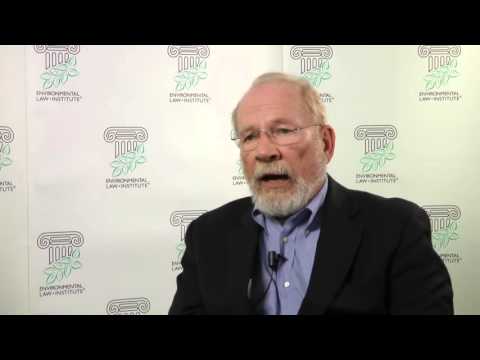 William Eichbaum (former Vice President, World Wildlife Fund): “I think the movement of the 70s was triggered by a couple of things. One, the air and water were demonstrably dirty, so there was a real issue. People began to write evocatively about it, Rachel Carson certainly being at the top of that list, but others [as well]. And then there were crises. There was the Cuyahoga River [that] famously caught on fire. There were die offs of seals in the Baltic Sea . . . . And I think that came together in a way that triggered a response by people that said ‘We want to do something about this."
William Eichbaum (former Vice President, World Wildlife Fund): “I think the movement of the 70s was triggered by a couple of things. One, the air and water were demonstrably dirty, so there was a real issue. People began to write evocatively about it, Rachel Carson certainly being at the top of that list, but others [as well]. And then there were crises. There was the Cuyahoga River [that] famously caught on fire. There were die offs of seals in the Baltic Sea . . . . And I think that came together in a way that triggered a response by people that said ‘We want to do something about this."
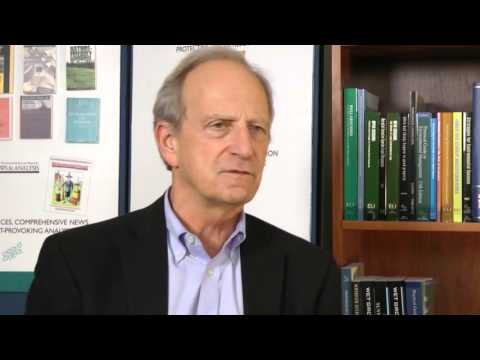 Denis Hayes (former organizer, Earth Day): “In [the] 1960s if you’d asked the average person what the environment meant they wouldn’t have had an answer. Some husky fraction of people who graduated from college [and] had taken a psychology course would say that the environment is the thing other than heredity that determines personality . . . . By 1970, there was not only an essentially universal understanding of what we meant by the term, but 80 percent of the people described themselves as environmentalists. It was one of those profound tipping points in society.”
Denis Hayes (former organizer, Earth Day): “In [the] 1960s if you’d asked the average person what the environment meant they wouldn’t have had an answer. Some husky fraction of people who graduated from college [and] had taken a psychology course would say that the environment is the thing other than heredity that determines personality . . . . By 1970, there was not only an essentially universal understanding of what we meant by the term, but 80 percent of the people described themselves as environmentalists. It was one of those profound tipping points in society.”
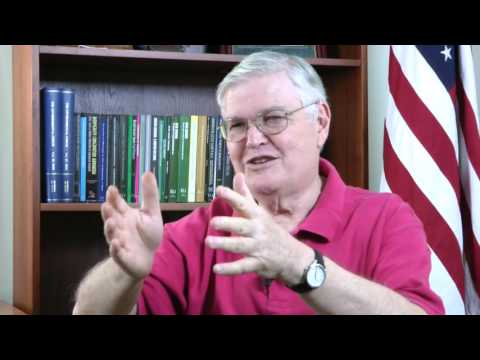 James Moorman (former Assistant Attorney General for Lands and Natural Resources, Justice Department): “What liberal standing to sue for environmentalists did was it broke up the bipolar industry-regulator; it created a tri-polar situation where a public group is in on the action. . . . So what happened in the environmental area was the beginning of a new model—the three polar model.”
James Moorman (former Assistant Attorney General for Lands and Natural Resources, Justice Department): “What liberal standing to sue for environmentalists did was it broke up the bipolar industry-regulator; it created a tri-polar situation where a public group is in on the action. . . . So what happened in the environmental area was the beginning of a new model—the three polar model.”
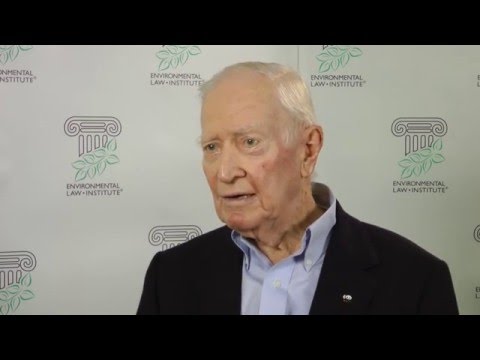 Russell Train (former Administrator, Environmental Protection Agency and Chair, US Council on Environmental Quality): “I sat at the head table and I happened to sit next to Richard Nixon. Naturally when he turned to me during the dinner period I took the opportunity to bend his ear on the environmental issues and told him how important I thought it was for his administration to give a high priority to this. That essentially is the . . . need for a focal point in government for environmental policymaking, which became the Council on Environmental Quality.”
Russell Train (former Administrator, Environmental Protection Agency and Chair, US Council on Environmental Quality): “I sat at the head table and I happened to sit next to Richard Nixon. Naturally when he turned to me during the dinner period I took the opportunity to bend his ear on the environmental issues and told him how important I thought it was for his administration to give a high priority to this. That essentially is the . . . need for a focal point in government for environmental policymaking, which became the Council on Environmental Quality.”
 John Adams (former President, NRDC): “I really believe the United States has been a model for environmental protection. No other country did it as well as we did when we started in the Clean Air Act and all the various statutes. They became a model for the world. You take a look at New York City. Ten years ago you couldn’t walk down Fifth Avenue, the diesel buses were blowing diesel smoke in your nose and would like to kill you. Now through litigation and negotiation and legislation, that’s all gone . . . .”
John Adams (former President, NRDC): “I really believe the United States has been a model for environmental protection. No other country did it as well as we did when we started in the Clean Air Act and all the various statutes. They became a model for the world. You take a look at New York City. Ten years ago you couldn’t walk down Fifth Avenue, the diesel buses were blowing diesel smoke in your nose and would like to kill you. Now through litigation and negotiation and legislation, that’s all gone . . . .”
And here is a wise note for the future:
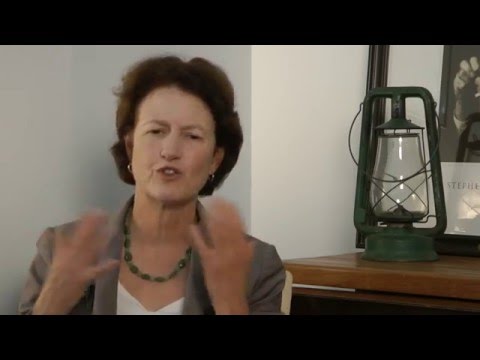 Frances Beinecke (former President, NRDC): “For 30 years, many in the country sort of thought, well the environmental movement can protect the environment and I’m going to go and do my thing, which is different, whatever it happens to be. I actually think that, to achieve environmental progress, there has to be a commitment and underpinning across the fabric of American society that believes in the value of environmental protections to their well-being. I actually think there is that feeling that we’ve done a lot of polling, we’ve seen there’s always a wide majority of people . . ., 60 to 70%, believe strongly in clean air and clean water. We need to unleash those voices because I think everyone has a stake in their own well-being and in their environmental future. “
Frances Beinecke (former President, NRDC): “For 30 years, many in the country sort of thought, well the environmental movement can protect the environment and I’m going to go and do my thing, which is different, whatever it happens to be. I actually think that, to achieve environmental progress, there has to be a commitment and underpinning across the fabric of American society that believes in the value of environmental protections to their well-being. I actually think there is that feeling that we’ve done a lot of polling, we’ve seen there’s always a wide majority of people . . ., 60 to 70%, believe strongly in clean air and clean water. We need to unleash those voices because I think everyone has a stake in their own well-being and in their environmental future. “
These stories are clearly a resource for historians and students. I hope that they also can be a source of inspiration for those of us who are working every day to protect the environment. Let’s give a big thanks to those who came before us who helped make it all possible.